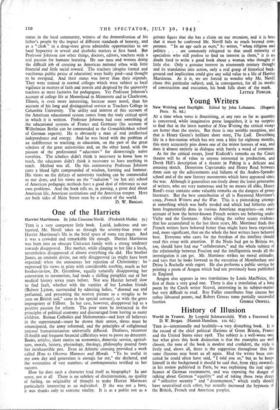One of the Harriets
Harriet Martineau. By John Cranston Nevill. (Frederick Muller. 5s.) expressed his views in print with considerable acerbity, much as her brother-in-law, Dr. Greenhow, equally naturally disapproving her conversion to mesmerism, had made a shilling pamphlet out of her medical history seven years before. Nor was Harriet herself slow to find fault, whether with the vanities of her London friends (Bulwer Lytton, surrounded by admiring ladies, " dizened out and perfumed, and presenting the nearest picture to a seraglio to be seen on British soil," came in for special censure), or with the gross impropriety of Vilktte. In her case, however, disapproval led to a positive passion for reform The poor must be instructed in the principles of political economy and discouraged from having so many children. Roman Catholics and Mahometans—and later all believers in the supernatural—must be shown their errors, slaves must be emancipated, the army reformed, and the principles of enlightened rational humanitarianism universally diffused. Deafness, recurrent ill-health and frequent financial difficulties were to prove no deterrent. Books, articles short stories on economics, domestic service, agricul- ture, morals, articles, phrenology, theology, philosophy poured from her inexhaustible pen. Even an Atlantic crossing provoked a work called How to Observe Manners and Morals. "To be useful in my own day and generation is enough for me," she declared, and the veneration of vast numbers of contemporaries testified to her SUM'S% How far does such a character lend itself to biography? In one sense, not at all There is no subtlety of discrimination, no quality of feeling, no originality of thought to make Harriet Marineau particularly interesting as an individual. If she was not a bore, it was thanks only to extreme vitality. It is as a public not as a private figure that she has a claim on our attention, and it is here that it must be confessed Mr. Nevill fails to reach beyond com- petence. "In an age such as ours," he writes "when religion and politics . . . are commonly relegated to that small minority of specialists who still profess to find an interest in them," it is no doubt hard to write a good book about a woman who thought of little else. Only a genuine interest in nineteenth century thought and its translation into action, only a real grasp of historical back-. ground and implication could give any solid value to a life of Harriet Martineau. As it is, we are forced to wonder why Mr. Nevin chose this particular subject, and, in consequence, for all its merits of construction and execution, his book falls short of the mark.
LEI-1.KB FOWLER.






















 Previous page
Previous page